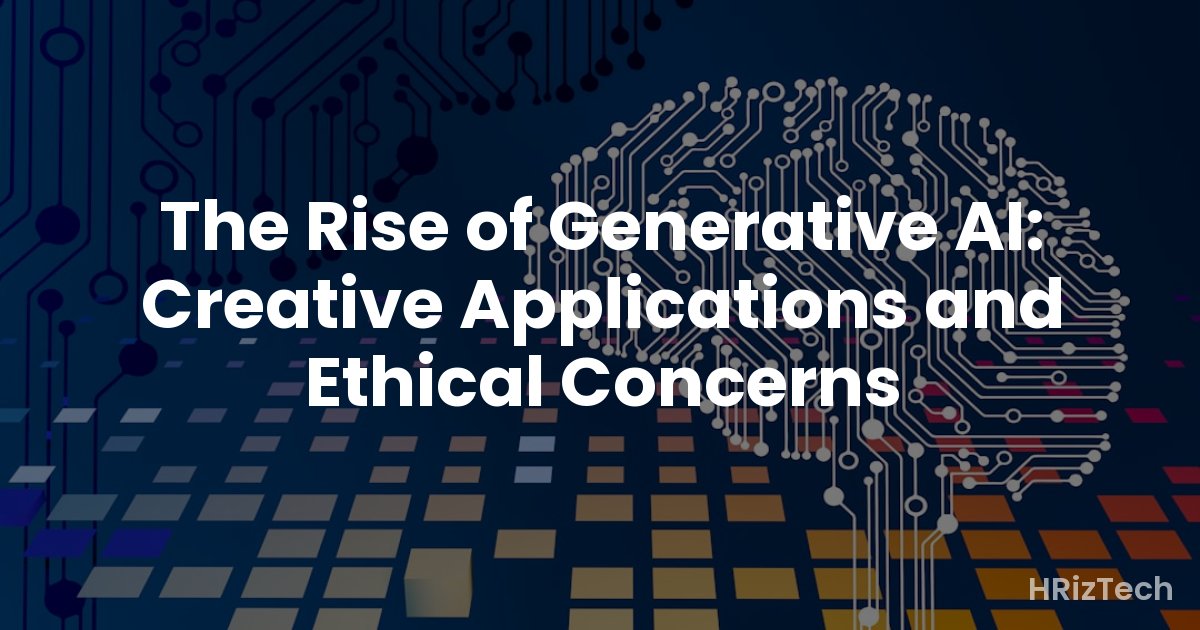The Rise of Generative AI: Creative Applications and Ethical Concerns

The Rise of Generative AI: Creative Applications and Ethical Concerns
- Generative AI is rapidly transforming creative industries.
- Ethical considerations are paramount in its development and deployment.
- Bias, copyright, and job displacement are key concerns.
- Responsible innovation is crucial for maximizing benefits and minimizing risks.
- The future of generative AI hinges on addressing these challenges.
Generative AI, the technology capable of creating new content such as text, images, audio, and video, is exploding onto the scene. From crafting compelling marketing copy to generating realistic artwork, its applications are vast and rapidly expanding. But with this exciting potential comes a crucial need to address the significant ethical concerns it raises. This article explores both the creative possibilities and the ethical dilemmas inherent in this revolutionary technology.
Creative Applications: Unleashing the Power of Generative AI
The creative industries are undergoing a seismic shift. Generative AI tools are no longer niche technologies; they're becoming increasingly accessible and user-friendly. Let's delve into some key applications:
Marketing and Advertising
Generative AI is revolutionizing marketing and advertising by automating content creation. Imagine generating personalized ad copy, crafting compelling social media posts, or even designing unique product visuals – all with the speed and efficiency of AI. This allows marketers to target specific demographics with tailored messaging, leading to increased engagement and conversion rates. However, the potential for misuse, such as creating misleading or manipulative content, needs careful consideration.
Art and Design
Artists and designers are exploring the creative potential of generative AI tools to produce stunning visuals, unique music compositions, and innovative architectural designs. These tools act as collaborators, augmenting human creativity rather than replacing it. They can assist in exploring new artistic styles, generating variations on existing themes, and overcoming creative blocks. Yet, the question of authorship and copyright remains a significant challenge.
Software Development
Generative AI is streamlining the software development process by automating code generation, bug detection, and testing. This accelerates development cycles and reduces the risk of human error. Tools can generate code snippets, translate between different programming languages, and even suggest improvements to existing code. The potential for increased productivity is immense, but the need to ensure code quality and security remains paramount.
Content Creation
From writing articles and blog posts to generating scripts for videos and podcasts, generative AI is transforming content creation. These tools can assist writers by suggesting ideas, improving grammar and style, and even generating different versions of the same text. While this can significantly increase productivity, ensuring the accuracy and originality of the generated content is vital. The ethical implications of AI-generated "fake news" and misinformation are also a significant concern.
Ethical Concerns: Navigating the Moral Landscape of Generative AI
The rapid advancement of generative AI brings a range of ethical dilemmas that demand careful consideration. These concerns are not mere theoretical possibilities; they are real-world challenges that need immediate attention.
Bias and Discrimination
Generative AI models are trained on vast amounts of data, which may reflect existing societal biases. This can lead to the perpetuation and even amplification of discriminatory outcomes. For instance, an AI model trained on biased data might generate images or text that reinforce harmful stereotypes. Mitigating bias requires careful data curation and algorithmic design.
Copyright and Intellectual Property
The legal landscape surrounding copyright and intellectual property in the context of generative AI is still evolving. Questions arise about the ownership of AI-generated content: is it the creator of the AI model, the user who prompted the AI, or the AI itself? Clearer legal frameworks are needed to address these ambiguities and protect the rights of creators.
Job Displacement
The automation potential of generative AI raises concerns about job displacement across various sectors. While AI may create new job roles, it could also render some existing jobs obsolete. Addressing this challenge requires proactive measures such as retraining programs and social safety nets to support workers affected by automation.
Misinformation and Deepfakes
Generative AI can be used to create highly realistic but entirely fabricated content, including deepfakes and other forms of misinformation. This poses a significant threat to public trust and social cohesion. Developing robust methods for detecting and combating AI-generated misinformation is crucial for maintaining a healthy information ecosystem.
Transparency and Accountability
It's essential to ensure transparency and accountability in the development and deployment of generative AI. Users should understand how these models work and what their limitations are. Mechanisms for redress and accountability are needed to address potential harms caused by AI systems.
The Path Forward: Responsible Innovation in Generative AI
The future of generative AI hinges on responsible innovation. This requires a multi-faceted approach involving collaboration between researchers, developers, policymakers, and the public. We need to establish ethical guidelines, develop robust regulatory frameworks, and promote public awareness of the potential benefits and risks of this transformative technology. Investing in research on AI safety and fairness is paramount.
The development and deployment of generative AI must prioritize human well-being and societal benefit. Addressing the ethical challenges proactively is not simply a matter of compliance; it's crucial for ensuring the responsible and beneficial integration of this powerful technology into our lives.
Key Takeaways
- Generative AI offers immense creative potential across various industries.
- Ethical considerations, including bias, copyright, and job displacement, must be addressed.
- Responsible innovation is crucial for maximizing benefits and minimizing risks.
- Collaboration and proactive measures are needed to ensure a positive future for generative AI.
What are your thoughts on the ethical implications of generative AI? Share your perspectives in the comments below!
Comments
No comments yet. Be the first to comment!